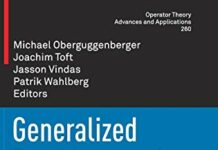
Ebook Info
- Published: 2011
- Number of pages: 352 pages
- Format: PDF
- File Size: 8.01 MB
- Authors: Michael Oberguggenberger
Description
This textbook presents an algorithmic approach to mathematical analysis, with a focus on modelling and on the applications of analysis. Fully integrating mathematical software into the text as an important component of analysis, the book makes thorough use of examples and explanations using MATLAB, Maple, and Java applets. Mathematical theory is described alongside the basic concepts and methods of numerical analysis, supported by computer experiments and programming exercises, and an extensive use of figure illustrations. Features: thoroughly describes the essential concepts of analysis; provides summaries and exercises in each chapter, as well as computer experiments; discusses important applications and advanced topics; presents tools from vector and matrix algebra in the appendices, together with further information on continuity; includes definitions, propositions and examples throughout the text; supplementary software can be downloaded from the book’s webpage.
User’s Reviews
Editorial Reviews: Review From the reviews:“This undergraduate work, translated from German, is designed around the concept that mathematical modeling and the underlying mathematics are central to computer science. … place a strong emphasis on algorithmic methods, and include a substantial number of examples of mathematical modeling. … Since the audience is computer science students, there are many examples and exercises … using the software packages MATLAB and Maple. … a useful acquisition for academic institutions where students have access to MATLAB and/or Maple. Summing Up: Recommended. Lower- and upper-division undergraduates.” (D. Z. Spicer, Choice, Vol. 49 (1), September, 2011)“The book is a translation of the original German version from 2005 … . Each chapter is preceded by a brief introduction for orientation. The text is enriched by computer experiments which should encourage the reader to actively acquire the subject matter. Finally, every chapter has exercises, half of which are to be solved with the help of computer programs. The book can be used from the first semester on as the main textbook for a course, as a complementary text, or for self-study.” (Petr Gurka, Zentralblatt MATH, Vol. 1238, 2012) From the Back Cover Mathematics and mathematical modelling are of central importance in computer science, and therefore it is vital that computer scientists are aware of the latest concepts and techniques.This concise and easy-to-read textbook/reference presents an algorithmic approach to mathematical analysis, with a focus on modelling and on the applications of analysis. Fully integrating mathematical software into the text as an important component of analysis, the book makes thorough use of examples and explanations using MATLAB, Maple, and Java applets. Mathematical theory is described alongside the basic concepts and methods of numerical analysis, supported by computer experiments and programming exercises, and an extensive use of figure illustrations.Topics and features:Thoroughly describes the essential concepts of analysis, covering real and complex numbers, trigonometry, sequences and series, functions, derivatives and antiderivatives, definite integrals and double integrals, and curvesProvides summaries and exercises in each chapter, as well as computer experimentsDiscusses important applications and advanced topics, such as fractals and L-systems, numerical integration, linear regression, and differential equationsPresents tools from vector and matrix algebra in the appendices, together with further information on continuityIncludes definitions, propositions and examples throughout the text, together with a list of relevant textbooks and references for further readingSupplementary software can be downloaded from the book’s webpage at www.springer.comThis textbook is essential for undergraduate students in Computer Science. Written to specifically address the needs of computer scientists and researchers, it will also serve professionals looking to bolster their knowledge in such fundamentals extremely well.Dr. Michael Oberguggenberger is a professor in the Department of Civil Engineering Sciences at the University of Innsbruck, Austria. Dr. Alexander Ostermann is a professor in the Department of Mathematics at the University of Innsbruck, Austria. About the Author Dr. Michael Oberguggenberger is a professor in the Department of Civil Engineering Sciences at the University of Innsbruck, Austria. Dr. Alexander Ostermann is a professor in the Department of Mathematics at the University of Innsbruck, Austria. Read more
Keywords
Free Download Analysis for Computer Scientists: Foundations, Methods, and Algorithms (Undergraduate Topics in Computer Science) 2011th Edition in PDF format
Analysis for Computer Scientists: Foundations, Methods, and Algorithms (Undergraduate Topics in Computer Science) 2011th Edition PDF Free Download
Download Analysis for Computer Scientists: Foundations, Methods, and Algorithms (Undergraduate Topics in Computer Science) 2011th Edition 2011 PDF Free
Analysis for Computer Scientists: Foundations, Methods, and Algorithms (Undergraduate Topics in Computer Science) 2011th Edition 2011 PDF Free Download
Download Analysis for Computer Scientists: Foundations, Methods, and Algorithms (Undergraduate Topics in Computer Science) 2011th Edition PDF
Free Download Ebook Analysis for Computer Scientists: Foundations, Methods, and Algorithms (Undergraduate Topics in Computer Science) 2011th Edition

